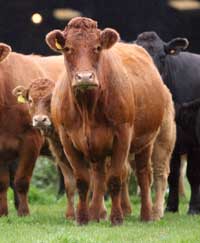Farming leaders brand Animal Health Bill as unfit for purpose

Industry leaders have voiced mounting concern over government plans to make farmers partially responsible for the cost of combating animal disease.
Less than a fortnight into a 12-week consultation on proposals to establish an independent body for animal health, the NFU has branded the draft legislation as unfit for purpose.
The government claims its new arrangements will reduce overall disease levels and the cost of combating outbreaks. Sharing responsibility for anti-disease measures with farmers will improve the effectiveness, efficiency and value for money, it argues.
Combined with independent and better-informed decision-making, responsibility sharing will improve the confidence of producers in the way disease risks are managed, according to DEFRA.
The involvement of the livestock industry and other stakeholders in fighting animal disease will help to promote financial transparency while ensuring the government is more accountable for the actions taken.
But NFU chief adviser Rob Newbery said the draft Bill would give farmers only a limited say in the operation of the new body responsible for animal health policy and delivery in England.
Costs, too, were unclear, with the government saying only that its plans would be unveiled in a future Finance Bill.
“This could mean that the new body will have no say on how or if revenue is raised,” Mr Newbery told Farmers Weekly. “The industry could face the imposition of tax on livestock keepers by the Treasury.”
The draft Bill also includes measures to reduce or withhold compensation from livestock-keepers deemed to have contributed to the circumstances that require their animal to be slaughtered. But this, too, was unworkable, Mr Newbery suggested.
“It may sound a sensible approach, but it would be impossible to set out guidance by which a government official could make a proportionate, risk-based decision on the vastly different farming systems and animal diseases.”
It was imperative that livestock producers ensured MPs and prospective MPs were made well aware of farmers’ frustration with the draft Bill and their fundamental opposition to the transfer of costs from DEFRA, said Mr Newbery.
“We already share a considerable amount of the overall costs of animal health policy. There is still time to make significant changes to this bill as we need to make the new body fit for purpose.”
A DEFRA spokesman said the contents of the draft Bill were only proposals out for public consultation and scrutiny in Parliament. Details had yet to be worked out and no new arrangements would be in place before April 2012.
The spokesman said: “The government remains committed to cost-sharing as a means of incentivising animal-keepers to take on their full responsibility for the management of animal health issues.”
Sharing health and welfare responsibilities would enable disease threats to be better managed, reducing overall risks and costs. More industry involvement in decisions would help ensure a more effective and efficient response.
